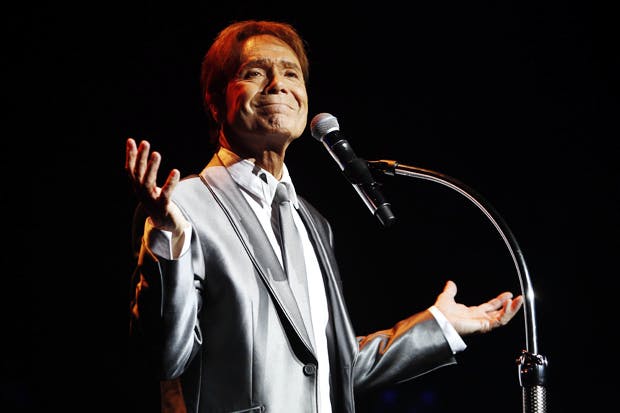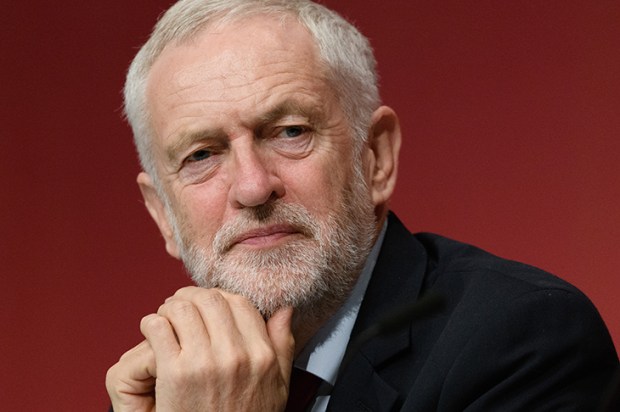Sir Cliff Richard will not be charged with historic sex offences, say the police and Crown Prosecution Service. There is ‘insufficient evidence’.
You, reader — yes, you: I cannot reveal your name because I’m making this up, but let’s call you Alan, and let’s suppose my reader-ship know very well who you are… you, Alan, respectable, hitherto-well-regarded Alan, are not going to be charged with smuggling into Britain a stash of sadomasochistic scatological pornography as a young man in 1983 because there is ‘insufficient evidence’.
How do you feel about that announcement, Alan? How do you feel after more than two years of sniggering and media speculation and an £800,000 investigation, since the police raided your house while you were away, with a BBC TV helicopter hovering above after the corporation had been tipped off about the imminent raid, and had done a deal with the police? Happy now? Your name cleared? Your reputation restored?
You feel pretty sick, don’t you? Because for the rest of your life, you’re the Alan who in the end wasn’t brought to court for a lot of disgustingly unmentionable stuff because there was insufficient evidence. You feel, I imagine, a bit like the acquitted defendant to whom the judge remarked: ‘Mr Jones, you walk free from this court with no other stain on your character.’
Nobody, I suppose, thinks the way Cliff Richard has been treated has been fair. He says he was ‘hung out like live bait’ in order to attract further allegations, and we can see exactly what he means. Indeed the police (who called a press conference in front of Sir Edward Heath’s house to announce similar allegations against the late Prime Minister) rather boast about what another victim, the broadcaster Paul Gambaccini, called their ‘flypaper strategy’.
Much of the disquiet we feel boils down to two complaints. First, that it’s cruel and wrong for the police to name individuals unless or until they’ve been charged. Secondly, that when it is decided that no charges will be brought, the preferred phrase ‘insufficient evidence’ still seems to leave a stain on the individual’s reputation.
I would be the last person to defend the police’s handling of a string of recent sex crime allegations, but neither of these complaints is quite as easy to resolve as some commentary has suggested. It needs looking at in depth by a cool-headed committee of legal experts. As no such inquiry has been announced, I have appointed myself to a one-man inquiry. Here are my findings.
First, the expression ‘insufficient evidence’. Plainly this can be misleading as it covers the whole range of possibilities, from ‘no evidence at all’ to ‘evidence leading to strong suspicions, but nothing that can be proved’. But equally plainly, the authorities cannot announce that a suspect has been ‘cleared’ when he or she hasn’t even been charged. Nor (as some have suggested) can they start describing anyone they don’t charge as ‘innocent’ because they cannot know that.
I’ve toyed with ‘inadequate’ evidence and ‘no useful evidence’ but the latter may not always be strictly true, and the former, like ‘insufficient’, provokes speculation that there was indeed some evidence but not quite enough, or not usable in court. ‘Insufficient’ leaves the impression that there may well be more out there somewhere, but it has not proved possible to find it.
The problem is the word ‘evidence’. Sometimes this amounts to mere accusation. I believe this has been the case in most or all of the recent investigations. Because the word ‘evidence’ itself covers a range of meanings, from ‘something possibly indicative’ to ‘nothing but an unsupported accusation’, the word should be avoided. I conclude that the stock phrase for police announcements should be ‘… found no basis for a charge’. I prefer this to ‘no basis for a criminal charge’ because the latter might be thought to hint that there could be a basis for some other kind of charge. I’m confident my proposed new wording answers the difficulties complained of.
The naming of suspects raises less tractable difficulties. In theory suspects are not in normal circumstances supposed to be named by the police or prosecuting authorities, still less the news media, unless and until the suspect is charged. However, if an official body like the police has named them or confirmed a rumour, media reports may follow suit.
In practice the police do sometimes tip off the media, occasionally (though this practice is being stamped out) for money; more often because they claim (sometimes reasonably) this may help in evidence-gathering; and too often because officers enjoy the excitement and national attention when famous figures are involved, hence the dawn raids. They usually deny having been the source of the ‘leak’ — but are adept at arranging for somebody outside their ranks to do the tipping off. My friend the former MP Harvey Proctor says this is what they did to him, having promised him they wouldn’t tip the media off.
Quis custodiet ipsos custodes? Given that the rule is already clear, and the police break it, I’m sceptical that rewording the prohibition would work. Aggrieved suspects have called for their accusers to be named too, but the principle that we may give information to the police in confidence is surely important.
Could we perhaps ‘punish’ police misbehaviour by voiding prosecutions on the grounds that early disclosure and sensational publicity has poisoned the air which juries must later breathe? Sometimes (as in the case of flagrant breaches of the sub-judice rule) this may be possible — had Sir Cliff been prosecuted he might have argued this — but names do anyway come out after a suspect has been charged, often in a blaze of publicity, and to start aborting prosecutions might give suspects a perverse incentive to get their own identities out early.
Regretfully I’ve concluded that if we cannot rely on the police to abide by their own rules, there’s no surefire way we can protect the privacy of those who may be interviewed but not charged. It is — as Cliff Richard must ruefully reflect — the price of fame. As he sang in his 1963 hit, ‘It’s all in the game.’
Got something to add? Join the discussion and comment below.
Get 10 issues for just $10
Subscribe to The Spectator Australia today for the next 10 magazine issues, plus full online access, for just $10.















Comments
Don't miss out
Join the conversation with other Spectator Australia readers. Subscribe to leave a comment.
SUBSCRIBEAlready a subscriber? Log in